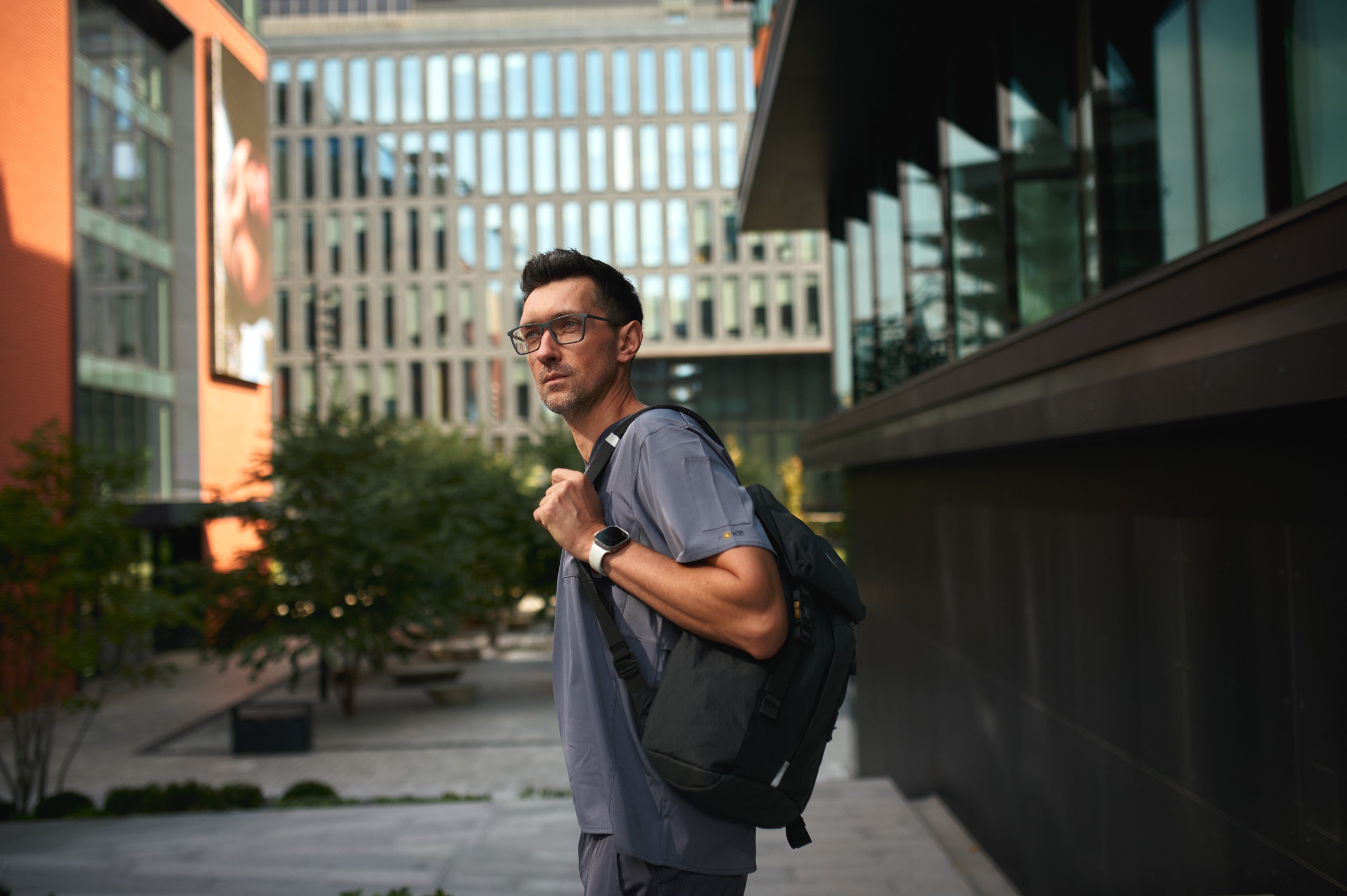Які ваші ранкові ритуали?
Ідеально — це пробіжка та коротка тренування, але це у світі без війни. І все ж іноді я знаходжу час на пробіжки, особливо під час подорожей, коли навіть можу бігати щодня. Однак з ранковими вправами мені важко. Кава (не найздоровіший вибір) перед швидкою п’ятихвилинною сесією планування — це мій єдиний стабільний ритуал, який допомагає мені почати робочий день з енергією.
Як ви відновлюєтесь після насиченого дня?
Я намагаюсь не перевтомлюватися, але, звісно, бувають дні з кількома лікувальними центрами і десятками людей, яким потрібна моя допомога, що може бути як фізично, так і емоційно виснажливо. Для фізичного відновлення дуже допомагають спорт — останнім часом це - теніс. Для психологічного відновлення я звертаюсь до своїх дівчат(дружини та 2 доньок), вони завжди обіймають мене, посміхаються, і спираються на моє плече — і я відчуваю майже повне відновлення.

Де ви знаходите натхнення?
Моя робота є величезним мотиватором. Мені пощастило працювати в сфері охорони здоров’я, де люди завжди шукають когось, хто допоможе їм пройти через важкі часи в житті. Підтримка пацієнтів через діагноз та лікування, передача як хороших, так і не дуже хороших новин, святкування їхнього одужання — все це надихає мене продовжувати практикувати медицину, незважаючи на унікальні труднощі роботи в державній охороні здоров'я. Звісно, тепер приватна практика також має честь мати мене в складі. Але саме відчуття того, що я потрібен щодня, навіть на вихідних, допомагає мені рухатись вперед і надихає і для моїх пацієнтів, і для мене.
Що стало переломним моментом у вашій кар’єрі?
Я пам’ятаю дуже важкий тиждень під час дворічної стажування в онкології-урології в клініці канадського університету в Торонто. Непорозуміння з місцевою системою і робочими відносинами, разом з абсолютно іншою культурою, поставили мене в емоційно складне становище. Але потім проста думка — що Канада не моя країна, і я тут, щоб забрати найкраще і привезти це назад до суспільства і країни, яка мене сформувала, — змінила мій настрій на позитивний. Я подумав: «Це тимчасово; мені потрібно ще 18 місяців практики з канадськими пацієнтами, і я зможу повернутись в Україну». Усвідомлення того, що досвід за кордоном робить мене кращим фахівцем вдома, дало мені нову перспективу та мету. Озираючись назад, я часто усміхаюсь і сміюся з тих "важких часів" за кордоном.

Яку роль у вашому житті відіграють подорожі та пригоди?
Подорожі — це спосіб відновлення як для життя, так і для роботи. Я люблю планувати подорожі від початку до кінця, від деталей маршруту до переживання нових і знайомих місць. Звісно, зараз доступ до подорожей обмежений, але я вірю, що одразу після перемоги ми з дружиною і нашими доньками вирушимо в прекрасну пригоду разом. Подорожуючи, я намагаюсь занурюватись у місцеве життя, пробувати їжу та дізнаватися якнайбільше про традиції та культуру. З роками я більше звертаю увагу на те, як колеги за кордоном балансують роботу і сім’ю, як соціальні динаміки формують їхній вільний час і як різні культури підходять до подорожей.

Як ви знаходите баланс між особистим і професійним життям?
Це, мабуть, найскладніше питання, оскільки, як я вже згадував, люди постійно потребують моєї допомоги. Коли ти лікар, особливо з фокусом на лікування онкології сечової системи, люди не соромляться дзвонити після 8 вечора в будь-яку суботу чи неділю. Я розумію їхнє нетерпіння та занепокоєння, але вихідні — це мій час для відновлення, щоб бути ефективним з понеділка. Іноді я можу здатися різким з особливо настирливими пацієнтами, але я знаю, що більшість онкологічних проблем не з’являються за одну ніч і не загрожують життю за один день. На щастя, тепер у мене є асистент, який може фільтрувати дзвінки за принципом "життя чи смерть" і призначати прийоми в звичайний час, забезпечуючи спокій та задоволення для всіх.

Яку пораду ви б дали тим, хто тільки починає кар'єру в медицині?
Ніколи не зупинятися і тяжко працювати. Постійно вдосконалюватися і не здаватися; будуть важкі часи в довгій медичній кар’єрі. Завжди будуть "більш успішні однокласники, які вже стали директорами", поки ти все ще на стажуванні. В нашій країні не вистачає висококласних спеціалістів, тому завжди є можливість стати найкращим і найуспішнішим, особливо коли сьогоднішня молодь так фокусується на якості життя, балансі та миттєвому успіху. Медицина не стається за одну ніч. Я впевнений, що ми подолаємо популярність "Instagram-лікарів" та "TikTok-інфлюенсерів". Коли справа дійде до довіри лікарю з вашим життям, йдеться про його освіту, досвід і кваліфікацію — а не кількість підписників. Тому працюйте тяжко, вчіться у кращих, особливо зараз, коли війна відкрила можливості для українських лікарів в світових медичних центрах. Але завжди повертайтеся, тому що Україні потрібні ви тут, а не десь ще.

Яку книгу чи подкаст ви нещодавно читали або слухали і порекомендуєте?
Нещодавно я читав "This is Going to Hurt: Secret Diaries of a Junior Doctor", чудовий, гумористичний погляд на виклики, з якими стикаються лікарі в британській системі NICE. Та сама система вплинула на медичну реформу в Україні. Це показує, що "трава не завжди зеленіша" і що кожна медична система має свої труднощі. Після того, як я повернувся з навчання в одній з найдорожчих медичних систем світу, США, я можу з впевненістю сказати, що це не найкращий вибір для нашої країни. Модель британської системи NICE здається оптимальною для України, хоча після прочитання цієї книги ви побачите, що "нам усім доведеться страждати" — і лікарям, і пацієнтам.
Які ваші цілі чи плани на майбутнє?
Працювати менше і більше часу проводити з родиною. Подорожувати більше і спостерігати за тим, як ростуть мої діти. Пацієнти завжди будуть, як показує практика, але моменти, які забирають подих поруч з близькими, варто наповнювати пам’яттю значно більше, ніж я маю зараз.
